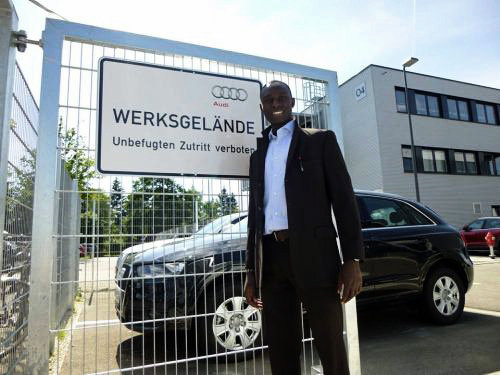“Du lässt mich diese Blogeintrag nochmal in Deutsch schreiben. Möchtest du in Deutschland studieren? Es ist ein groß unterschied wie leben im Ausland sich vorstellt, und wie es wirklich ist! Aber es ist auch möglich für jemand einen schönen leben zu haben, besonders wenn Sie gut Deutsch sprechen konnen. Deswegen schenke mir Ihnen ein paar Tips, damit zu vorbereiten.”
Having read those (Kindergarten level) words, you would probably envy me, more so if you have never been to a German class. If only I can tell you how hard I have struggled, how long it has taken me to write them, that you appreciate the hustle of learning this language, articulated so well by Mark Twain who wrote Die schreckliche deutsche Sprache (“The Awful German Language”) probably with someone like me in mind.
Does learning the German language frighten you? One of the first challenges faced by international students in Germany is their encounter with the language. Having learnt several other dialects before, most students are continually perplexed by the uncountable turns and twists of the German language, yet end up falling so deeply in love with it as they outgrow the limitations with regular and consistent usage.
I still remember how we used to joke with my friends at Goethe Institut, Nairobi. So fascinated with the language were we that we literally coined some hilariously out-of-tune combinations you would never repeat loudly in class: “Ich bin Schlüssel!” “Ich habe Stomach Aufzug!” “Ich esse das Auto!” Ïch heiße Büro!”
For many international students, it is helpful to embrace the challenge with a positive mind-set. It is a beautiful language, in fact, I feel it is more a cultural immersion than a language training. My friends, all who speak better German than I do, seem to think more logically and clearly too. It is one of those languages which re-aligns your brain, activating new circuits and making your thinking processes more vibrant. And it comes with many street-level benefits too.
Based on my experience, it is invaluable for anyone intending to study in Germany to take time and learn the language. Not only is this useful, but it makes your living in Germany more practical. Germans love to speak their language, they like it when you show effort to speak to them in their language too, irrespective of how many mistakes you may make in your grammar. Whether your studies are in German or English, your street-level experiences will near always be in German. “Guten Tag. Entschuldigung. Bitte. Danke…” are some of the basic magic words which will make you fit well.
Where can you learn the German language?
Worldwide, Goethe Institut is recognised as a centre for teaching and testing German language skills in the four main categories of competence: reading, writing, listening and speaking. You can find a local Goethe Institute at a city in your home country, or in various cities across Germany. Another reputable institution for German language training within Germany is the interDaF e. V. am Herder-Institut der Universität Leipzig. This institution offers comprehensive language courses, delivered in practical easy to understand methodologies. They also often combine excursions within their studies making it easy to learn Germany culture.
That said, the next question you definitely wish answered is: How easy is it to master the language? There is no one answer to this; some students find it easy, while others struggle through the language. As a foreigner, being surrounded by the fast-spoken German is a very confusing experience. It is even scarier when you wish to get some really important information. For the first few weeks, I had to keep my map open even in the “Straßenbahn” (thank God they have those screens showing destinations and stages along the way). Then came my first solo journey with the ICE (three connections over a six-plus hour period). In this journey, all I heard from the German version of the train pilot’s address was “Auf Wiedersehen!”… you should have seen the horror in my face every time we neared a connection point, with only a brief moment to decide if it’s the right “Haltestelle” to disembark. Or whenever there was an announcement especially of delayed connections, all rendered in German!
Do not be discouraged when you black out on some days and get confused with the many twists of the language, it is all part of the learning. The best part about learning the German language is that it is possible. It may be slow for some, fast for others. But with passion and dedication, you would slowly open your mind to one of the most beautiful languages in the world. Good Luck!!
By Adams Mututa, a Kenyan doctorate student at the Eberhard Karls University in Tübingen.











